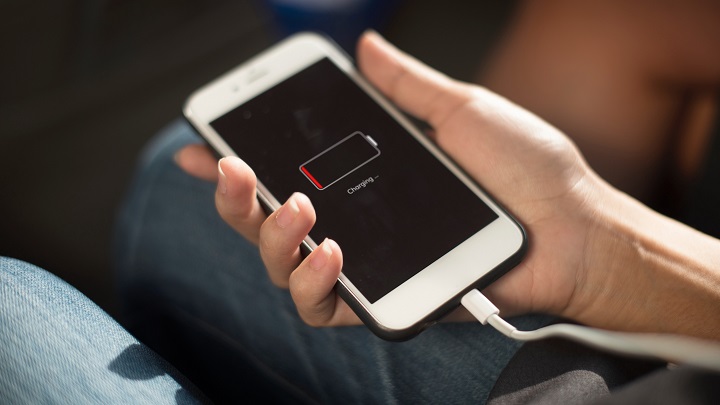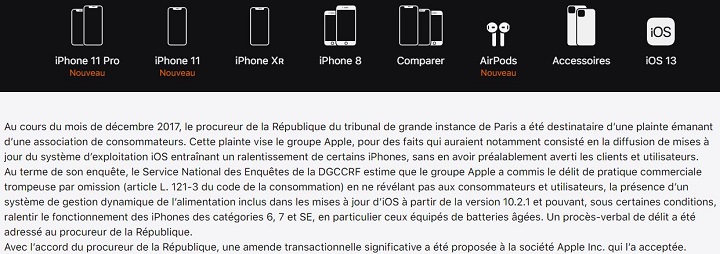Apple Punished for Slowing Down Older Phones - Again
France has imposed a fine of €25 million on Apple for deceptive marketing practices. This is the result of the iOS update scandal, which began in 2017 and resulted in lawsuits in France, Italy, the USA and Israel.

IN A NUTSHELL:
- In 2017, Apple releases two iOS 10 updates for iPhone 6. The first one causes the devices to instantly deplete the battery and spontaneously turn off. The second one fixes bugs but causes a noticeable slowdown of the phones. This is to extend the life of the devices due to the loss of performance of the batteries.
- Users were not warned about the effects of the update, nor were they given the possibility to restore devices to a previous system version.
- Unaware of the manufacturer's intentions, owners of iPhones 6 have decided that aging batteries or phone processors are the sources of the problem: they buy new batteries or completely replace the phone with a newer model.
- The media reports about the affair, but also about lawsuits: in France, Italy, the USA, and Israel (in 2018 Italy imposed a fine of 5 million euro on Apple). At the end of the year, Apple apologized to users and introduced the option to turn off the "retarder".
- France decides to impose a fine of 25 million euro on the corporation and obliges it to publish a relevant press release on the manufacturer's website about its harmful consumer practices.
- Apple continues to slow down older iPhone models when their battery starts to lose performance - but it now lets users know.
A French unit under the slick acronym DGCCRF (or Direction générale de la concurrence, de la consommation et de la répression des fraudes), which is concerned with upholding competition rules, consumer rights and controlling unfair practices within these areas, has imposed a fine of €25 million (more than 27 million dollars) on Apple for deceptive actions against its customers.
The said deceptive practices took place in 2017 and have been widely publicized in the industry media. It was based on the manufacturer's failure to inform owners of specific models of iPhones that updating the device is likely to slow it down and make it impossible to restore an earlier version of iOS.
The first update (10.2.1) made it practically impossible for some owners of older iPhones to use the phone (low battery life, spontaneous switching off), the second one (11.2) - released to 'patch' the first one - fulfilled its purpose, but it also made the devices visibly slower. And all this is to increase the efficiency of the phones.
As a result, unaware of Apple's intentions, users were indirectly forced to purchase either a new battery in order to improve the phone's performance, or a completely new device (some of them attributed the performance drop to the processor). So Apple was making business on the whole affair. The official statement of the French unit reads:
"The DGCCRF found that users of iPhones were not informed that iOS updates (10.2.1 and 11.2) could slow down the system.
These updates, made available in 2017, took into account changes in power management, which in some cases - especially when the batteries were old - may have slowed down the operation of iPhone 6, SE and 7 models.
As it was not possible to restore the devices to the previous version of the system, many customers were forced to replace the batteries or even buy a new phone.
[...] With the approval of the Public Prosecutor's Office, Apple has been offered a settlement agreement containing a fine of 25 million euros and an appropriate monthly publication on the manufacturer's website. The settlement has been accepted."
Apple's statement has already been posted on the iPhone website.

It is worth recalling that in 2017, after the outbreak of the "slow down scandal", Apple admitted that it was aware of the effects of the controversial system update - the patch was introduced not to force customers to replace their devices, but to extend the life and improve the efficiency of phones using lithium-ion batteries that lose their performance over time. As compensation, the company also allowed its users to buy a new battery at a reduced price - as many as 11 million people took advantage of the offer. The company apologized to the users, and Tim Cook, its president, assured:
"Our actions were all in service of the user, I can't stress that enough. Maybe we should have been clearer at a point in time but our actions were always the purest."
But don't get any ideas. Despite fine imposed by Italy (5 million euro in 2018) and France, Apple continues to slow down older models as battery performance drops. However, the corporation has learned its lessons, and is now informing users about the changes - now not as severe as in 2017 (because the necessary improvements were made). You can also turn off the slow down. Here are the iPhone models subject to the practice:
- iPhone 6, 6 Plus, 6S, 6S Plus,
- iPhone SE,
- iPhone 7 and 7 Plus,
- iPhone 8 and 8 Plus (iOS 12.1 or higher),
- iPhone X (iOS 12.1 or higher),
- iPhone XS, XS Max and XR (iOS 13.1 or higher).
Users of the above iPhones, do you knowingly use the slowdown tool?
0

Author: Julia Dragovic
She studied philosophy and philology and honed her writing skills by producing hundreds of assignments. She has been a journalist at Gamepressure since 2019, first writing in the newsroom, then becoming a columnist and reviewer, and eventually, a full-time editor of our game guides. She has been playing games for as long as she can remember – everything except shooters and RTSs. An ailurophile, fan of The Sims and concrete. When she's not clearing maps of collectibles or playing simulators of everything, economic strategies, RPGs (including table-top) or romantic indie games, Julia explores cities in different countries with her camera, searching for brutalist architecture and post-communist relics.
Latest News
- End of remote work and 60 hours a week. Demo of Naughty Dog's new game was born amid a crunch atmosphere
- She's the new Lara Croft, but she still lives in fear. Trauma after Perfect Dark changed the actress' approach to the industry
- „A lot has become lost in translation.” Swen Vincke suggests that the scandal surrounding Divinity is a big misunderstanding
- Stuck in development limbo for years, ARK 2 is now planned for 2028
- Few people know about it, but it's an RPG mixing Dark Souls and NieR that has received excellent reviews on Steam, and its first DLC will be released soon

